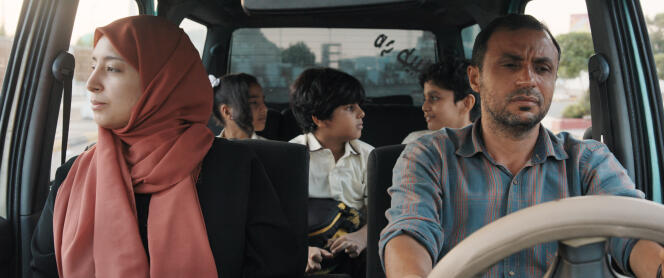


LE MONDE'S OPINION – NOT TO BE MISSED
A film from Aden, Yemen's ancient port on the southwestern tip of the Arabian Peninsula, is a miracle in itself. Most cinemas and theaters were closed by Islamists following the reunification of the south and north of the country in 1990. In the wake of the Arab Spring in 2011, the southerners in Aden attempted to regain control, at the cost of a bloody civil war in 2014, pitting the Iranian-backed Houthis against the Saudi-backed Yemeni government. A new ceasefire agreement was signed in December 2023.
So, given all of this, a film might seem derisory. But for Yemeni director and southerner Amr Gamal, just 40 years old, the camera satisfies an urgent need to document. His second feature, The Burdened, selected for the Panorama section of the 2023 Berlinale, is a fascinating portrait of a city in a state of decay, just like the couple whose adventures we follow.
Ahmed (Khaled Hamdan), a journalist on public television and father of three, hasn't been paid for two months, so in the meantime, he works as a taxi driver. His wife, Isra'a (Abeer Mohammed), is pregnant for a fourth time, and for them, it's a catastrophe. Unable to pay their rent, they are about to move into a shabby apartment. They also have to save to pay for private schooling, as the public system is no longer up to scratch.
Ahmed and Isra'a have a single obsession: Ending their unwanted pregnancy. The film questions the beliefs and taboos surrounding abortion in a country where it is forbidden. However, the sheikhs have different points of view, which they do not refrain from expressing on social media. While some assert that, from day one, the embryo is a human being, others believe that abortion before the 40th or 120th day of pregnancy is not a sin. A few doctors take advantage of this uncertainty to carry out clandestine abortions, for which they are paid handsomely. We never know what lies ahead for Ahmed and Isra'a, a couple worn out but united by destiny. The two actors wear the weariness on their faces with disconcerting naturalness.
Husband and wife come up against every barrier, from the private clinic, where Isra'a is categorically refused, to the public hospital, where a close friend, Muna (Samah Alamrani), works as an obstetrician-gynecologist and considers the arrival of any child a blessing. The director uses family conversations, news on the radio and encounters in the cab to create a buzzing atmosphere of crisis. On the side of a road, public television technicians dare to gather in protest, "mouths sewn shut" by red tape.
You have 25% of this article left to read. The rest is for subscribers only.
